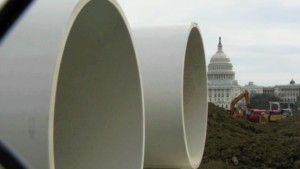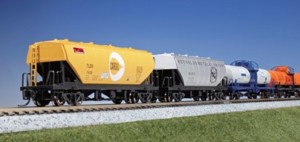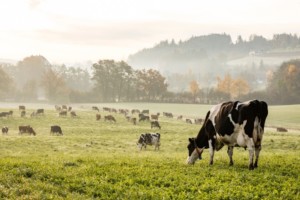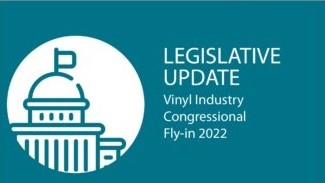This website uses cookies so that we can provide you with the best user experience possible. Cookie information is stored in your browser and performs functions such as recognising you when you return to our website and helping our team to understand which sections of the website you find most interesting and useful.
News
The Vinyl Congressional Fly-In focus Issues
The 2022 fly-in took place this past week in Washington D.C. on May 16-18. It was a great opportunity to meet with elected officials to advance key issues impacting the vinyl industry. This year some of the issues we focused on included, Toxic Substances Control Act (TSCA), the Farm Bill and the role PVC should play, water infrastructure, and more! With over 50 meetings with congressional offices, this years fly-in was a great success! Check out the 2022 Fly-In data below! Read about the issues addressed below.
Vinyl Institute Virtual Fly-In Data Sheet
 EPA overreach on TSCA (Toxic Substances Control Act):
EPA overreach on TSCA (Toxic Substances Control Act):
Frank R. Lautenberg Chemical Safety for the 21st Century Act (TSCA ) passed Congress in 2016 with overwhelming bi-partisan support after years of careful consideration. The bill passed the House 403-12 and in the Senate by voice vote – with 61 cosponsors (35 Republicans). Now the EPA, however, is not using the best available science standards, as directed by the statute to make decisions. TSCA risk evaluations should be limited to what is in the TSCA law and they should follow the intent of Congress. During the fly-in, vinyl industry leaders asked members of Congress to oversee EPA’s implementation of TCSA by scrutinizing its allocation of resources in setting TSCA regulatory priorities and conducting specific chemical assessments.

Buy America and the Infrastructure Investment and Jobs Act (IIJA):
The IIJA legislation provides $55 billion in new funding for water and wastewater infrastructure including the installation of PVC water and wastewater pipes. The legislation also includes funding for EV readiness and funds for recycling infrastructure and education. We want Congress to ensure that Buy American amendments don’t stymie the historic investments in infrastructure proscribed by this law. There is ambiguity in the law between our international obligations under NAFTA, and Buy America is creating uncertainty that the demand for PVC pipe can be met in North America. While the vast majority of PVC pipe used in the United States is produced domestically, some of the U.S. manufactured PVC resin is converted into PVC pipe in Canada.

Surface Transportation Board and Competitive Switching:
Industry leaders also asked Congress to support a Surface Transportation Board Reauthorization Act that will increase access to competitive options, including competitive or reciprocal switching. Consolidation within the freight rail industry has reduced the number of rail carriers, which is forcing American farmers and manufacturers to pay non-competitive rates for rail service. The Surface Transportation Board’s (STB’s) recent Annual Rail Rate Index Study shows that since 2004, real rail rates (adjusted for inflation) have increased by 30%. Many shippers remain captive to their railroad, even when reciprocal switching could help relieve railroad service disruptions and congestion. Reciprocal switching can improve cost and reliability and can be implemented without compromising railroads’ ability to invest in the rail network or harming service for other tail customers. If the STB approves reciprocal switching, this reform will help improve supply chain logistics.

Support for PVC in the 2024 Farm Bill:
The Environmental Quality Incentives Program (EQIP) provides financial and technical assistance to agricultural producers and non-industrial forest managers to address natural resource concerns and deliver environmental benefits including improved water and air quality: conserved ground and surface water, increased soil health, and reduced soil erosion and sedimentation; improved or created wildlife habitat; and mitigation against drought and increasing weather volatility. PVC is an ideal material for these programs. This week we asked Congress to support increased funding for USDA Programs in the Conservation Title that provide critical assistance to farmers in meeting water quality, drought, and nutrient management challenges. These funding priorities include the Environmental Quality Incentives Program (EQIP) – which assists in financing irrigation efficiency and supports increased funding for USDA programs in the Energy Title that provide farmers critical assistance in meeting energy generation, energy efficiency, and climate challenges.


